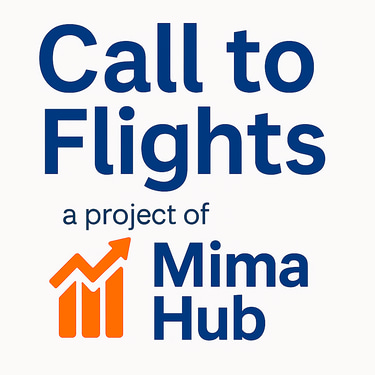How to Negotiate Better Payouts with Flight Advertisers
BUSINESS & PARTNERSHIPS – SEO PROMPTS
8/12/20257 min read


Understanding the Flight Advertising Landscape
Flight advertising represents a unique sector within the broader advertising industry, characterized by its distinct approach and business models. At its core, this industry focuses on promoting flights, travel packages, and related services, often targeting a highly motivated audience ready to make travel arrangements. Advertisers in this realm typically include airlines, online travel agencies (OTAs), and travel service providers, all of whom seek to optimize their visibility and reach through various advertising platforms.
One of the primary ways that flight advertisers differentiate themselves from traditional advertisers is through their specific targeting strategies. Flight advertisers often leverage data analytics to understand consumer behavior, allowing them to tailor their messages to segments of the audience that are actively considering travel. This precision in targeting is essential because it leads to higher conversion rates and better returns on investment.
The advertising models employed by flight advertisers can vary significantly, but many rely heavily on performance-based metrics. A popular structure within this landscape is the pay-per-call model, which allows advertisers to pay based on the calls generated from their ads. This model not only incentivizes the achievement of measurable outcomes for advertisers but also aligns the interests of both parties involved. For instance, an effective pay-per-call strategy allows advertisers to invest in campaigns where they only incur costs when valuable leads are generated.
Understanding the intricacies of these models is crucial for anyone looking to negotiate better payouts with flight advertisers. By grasping the nuances of the flight advertising sector, advertisers and partners can engage in more effective negotiations, ensuring that outcomes are mutually beneficial. This insight serves as a foundation for fostering successful relationships that can lead to enhanced profitability and overall performance in the competitive landscape of flight advertising.
The Importance of Negotiation Strategies
Negotiation is a vital skill in the aviation advertising sector, particularly when seeking to secure favorable payouts from flight advertisers. Mastering effective negotiation strategies can significantly enhance the financial returns of advertisements. To begin with, preparation is key; thorough research into the specifics of the flight advertising industry equips a negotiator with the necessary insights into market rates, trends, and competitors. Understanding the landscape allows advertisers to cite benchmarks that can support their case for improved payouts.
Setting clear goals is another crucial component of successful negotiation. Before entering discussions, advertisers should outline their objectives, such as the minimum acceptable payout, preferred terms, or even the ideal partnership conditions. Having these goals in mind helps maintain focus during negotiations and prevents concession on critical aspects that could undermine the potential benefits of the agreement.
Furthermore, it is essential to recognize the motivations of flight advertisers. Understanding what drives these advertisers—whether it is maximum exposure, performance metrics, or budget constraints—can provide valuable leverage during negotiations. By aligning their proposal with the advertiser's objectives, negotiators can present offers that are mutually beneficial. For instance, highlighting how a higher payout could result in more engaging advertisements or greater audience reach may resonate well with advertisers keen on maximizing their investment.
Ultimately, employing effective negotiation tactics, such as active listening and constructive framing, allows advertisers to create an atmosphere of collaboration rather than confrontation. This approach fosters a relationship built on trust and openness, which is vital for securing lucrative and sustainable agreements. By integrating these strategies into their negotiation processes, advertisers can improve their chances of attaining better payouts, shaping more advantageous partnerships within the competitive flight advertising landscape.
Value Metrics to Consider in Negotiations
Negotiating better payouts with flight advertisers requires a strategic approach that emphasizes key value metrics. Affiliates should carefully consider various key performance indicators (KPIs) to strengthen their negotiating position and demonstrate the value they bring to the table. Among these metrics, conversion rates, average order values, and pay-per-call return on investment (ROI) stand out as critical factors in justifying requests for higher payouts.
Conversion rates serve as a fundamental metric reflecting the effectiveness of affiliate marketing efforts. A higher conversion rate signifies that the affiliate’s strategies successfully influence potential customers to complete a booking. By presenting impressive conversion rates, affiliates can showcase their ability to drive sales, thereby validating an increase in payout percentages. Similarly, examining average order values provides insight into the quality and spending habits of customers referred by the affiliate. A higher average order value indicates that affiliates attract more lucrative business, warranting a discussion on enhanced compensation.
In addition to conversion rates and average order values, the pay-per-call ROI metric is essential for affiliates operating within performance-based models. This metric assesses the profitability of inbound calls generated through affiliate marketing campaigns. By emphasizing the cost-effectiveness of these calls, affiliates can not only highlight their contributions to the advertisers’ bottom line but can also advocate for payouts that reflect this value. It is vital to track and analyze these metrics consistently, as they provide tangible evidence during negotiations.
Overall, understanding and leveraging these value metrics empower affiliates to present compelling arguments for better payouts. By illustrating their effectiveness in driving conversions, securing higher order values, and generating profitable calls, affiliates create a strong case that justifies their compensation expectations. This analytical foundation is essential in establishing a robust negotiation stance with flight advertisers.
Leveraging Affiliate Relationships
Affiliates often find themselves in a competitive space, striving to maximize their earnings through flight advertisers. To achieve better payout terms, affiliates should focus on leveraging their relationships with these advertisers. A foundational aspect of this strategy involves maintaining effective communication. Regular check-ins and updates about campaign performance can foster transparency, allowing both parties to align their goals and ensure mutual success. Being proactive in communication not only demonstrates commitment but also lays the groundwork for negotiating more favorable payouts.
Providing performance data is another vital element in convincing flight advertisers of the affiliate’s value. By showcasing metrics such as conversion rates, click-through rates, and overall ROI, affiliates can illustrate the positive impact they have on an advertiser's business. This data-driven narrative helps to establish a clear case for why the affiliate deserves improved payouts. Advertisers are more likely to respond positively to affiliates who can substantiate their contributions with evidence, thereby enhancing their negotiating leverage.
Moreover, building a rapport with flight advertisers is essential for fostering long-term collaboration. Trust is a cornerstone of any productive relationship, and affiliates should aim to cultivate this through consistent engagement and reliability. Attending industry events, participating in webinars, or simply being receptive to feedback can help affiliates strengthen their ties to advertisers. This level of connection often leads to additional opportunities, such as exclusive promotions, bonuses, or higher payout percentages. Ultimately, affiliates who invest in relationship management are better positioned to negotiate terms that benefit them in the competitive landscape of flight advertising.
Crafting a Winning Proposal
Creating a compelling proposal is fundamental for negotiating better payouts with flight advertisers. A well-structured proposal not only outlines your objectives but also showcases the potential benefits for both parties involved. To begin with, the proposal should clearly state your goals. Having specific, measurable objectives will help flight advertisers understand what you aim to achieve, making it easier for them to see the value in your request for higher payouts.
Secondly, anticipated results are a crucial component of a successful proposal. By including projections based on past performance and industry benchmarks, you can effectively demonstrate the potential return on investment (ROI) that your proposal offers. This data-driven approach allows advertisers to visualize the impact of their financial commitment, thereby making your case stronger. Utilize graphs or charts for a visual representation of your data, as these tools can help clarify expectations and make your proposal more engaging.
Moreover, addressing potential concerns that flight advertisers may have is integral to your proposal. Acknowledge challenges they might face, such as fluctuating travel patterns or budget restrictions, and present solutions within your proposal. This proactive approach portrays you as a knowledgeable partner rather than just a prospective client. When you present your proposal, ensure that it is professional and visually appealing. Use clear language and a coherent structure to facilitate comprehension and maintain the advertiser's interest.
By thoughtfully crafting a proposal that encompasses clear objectives, anticipated results, and addressing concerns, you will enhance your ability to negotiate better payouts. Presenting a professional and persuasive case lays the groundwork for fruitful discussions with flight advertisers.
Practical Tips for Successful Negotiation
Negotiating better payouts with flight advertisers requires a strategic approach to ensure favorable outcomes. To equip affiliates with effective negotiation skills, it is essential to prepare thoroughly before entering discussions. One practical step is to conduct comprehensive market research. Understanding the current advertising trends, payout norms, and competitor offerings will enable you to present compelling arguments during negotiations. Additionally, create a list of your achievements, including metrics such as conversion rates and reach, to demonstrate your value to the advertiser.
Once you're prepared, it’s crucial to approach the negotiation table with confidence. Start the discussion by clearly stating your goals and the justification for your requested payout increase. Be open to dialogue, emphasizing that you are seeking a mutually beneficial agreement. During the negotiation, you may encounter common objections from advertisers, such as budget constraints or performance concerns. It is vital to respond to these objections with well-prepared rebuttals. For instance, if an advertiser expresses hesitation about increased payouts due to performance insecurity, share insights from your previous successful campaigns that highlight your capacity for driving significant traffic and conversions.
Follow-up is a critical component of successful negotiations. After the initial discussion, send a concise summary of what was agreed upon, reiterating the key points discussed. Maintaining open lines of communication can reinforce your commitment and may prompt the advertiser to reconsider their position. Furthermore, consider scheduling a follow-up meeting or call to revisit the negotiation if it initially did not yield the desired results. By implementing these actionable steps—preparing thoroughly, addressing objections tactfully, and following up diligently—you can enhance your negotiating prowess and secure better payouts with flight advertisers effectively.
Frequently Asked Questions
Negotiating better payouts with flight advertisers can often lead to confusion, especially for affiliates who are new to the process. Addressing common queries related to these negotiations can provide clarity and empower affiliates to make informed decisions.
One common question revolves around what to do if negotiations do not go as planned. It is essential to remain calm and professional during discussions. If the advertiser is unable to meet your desired payouts, consider evaluating their justification and assessing whether the partnership is still beneficial. It's also wise to explore alternative options within the same advertiser or diversify your partnerships to mitigate any potential losses. Understanding your value to the advertiser and being willing to articulate that can often lead to reevaluation down the line.
Another frequent inquiry concerns how often an affiliate should renegotiate terms. The answer often depends on market conditions and individual performance metrics. However, a general guideline is to reassess your agreements every six months to a year. Regular evaluations allow you to adapt to changing circumstances and maintain competitiveness in the industry. Monitoring your performance against market trends can provide leverage for negotiations and ensure that you're not undervalued.
Lastly, numerous scenarios can affect payout negotiations. For instance, seasonal fluctuations in travel demand may temporarily alter negotiation dynamics. Similarly, changes in industry regulations and market competition can also play a role. Affiliates should remain informed about these external factors and be prepared to pivot their negotiation strategies accordingly. By staying knowledgeable, affiliates can better advocate for their desired terms in payout discussions with flight advertisers, enhancing their financial outcomes.

Join
Stay updated with our latest insights.
Stay Updated
team@mimahub.com
+62 (817) 3940-82
© 2025. All rights reserved.
